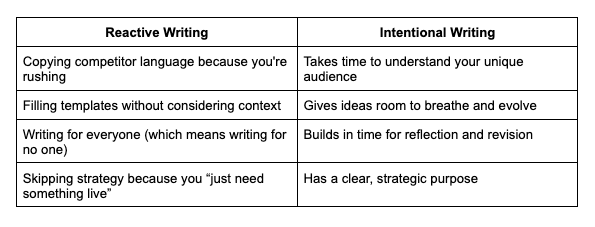- Word for Word
- Posts
- The Only Writing Resolution You Need This Year
The Only Writing Resolution You Need This Year
A case for slow writing in a fast world
Your inbox is probably full of "New Year, New Marketing Strategy" advice right now. Delete it all. Here's the only writing resolution that matters in 2025: Stop writing everything like it's an emergency.
You know what I mean. That landing page you wrote at 2 AM, fueled by deadline panic and whatever emergency snacks you found in your desk drawer. The "quick update" to your pricing page that somehow took three hours and part of your soul. The blog post that started as careful thought leadership and ended as a desperate SEO fever dream, stuffed with keywords like a chatbot having an existential crisis.
This is business writing in our time: a constant state of emergency, a perpetual panic room with WiFi. We've all become literary first responders, typing with one hand while putting out fires with the other. In the distance, sirens (or maybe just more Slack notifications).
Here's the thing about emergency writing: it's not just bad writing. It's expensive writing. Every rushed job, every panicked revision, every "we need this by EOD" request costs you - in quality, in stress, and usually in results. I learned this the hard way during years as an agency writer, where "ASAP" was basically everyone's middle name.
The most successful writers I know - whether they're in tech, marketing, or creative agencies - aren't necessarily the most talented. They've just mastered the art of intentional writing. They've built systems and boundaries that protect their creative process. They've learned to say "no" to the urgency addiction that plagues most business writing. The true digital philosophers understand that most business writing emergencies are just poor planning wearing a crisis costume.
What Intentional Writing Looks Like
Intentional writing isn't about perfect prose. It’s about approaching your work as a strategic act rather than a reactive one. Here's the difference:

The Three Sacred Questions
Before starting any writing project, ask yourself these three questions:
What's the real deadline? (Not the panic deadline, not the "ideal" deadline, but the actual moment the world will end if this copy isn't done)
Who am I really writing for? (And no, "everyone with a pulse and a credit card" is not a target audience)
What's one thing I want them to think, feel, or do? (Besides "immediately schedule a demo," you ambitious thing)
If you can't answer these questions, you're not ready to write. You're just preparing to panic-type into the void, hoping something sticks.
Your 2025 Writing Challenge
Here's your only writing resolution for 2025: Create the space for intentional writing.
Build temples of time around your work. Learn to say "no" to the cult of urgency. Treat writing like the strategic art it is, not like a panic attack with a word count.
Start small. Pick one writing project this week and give it the intentional treatment. Ask those three key questions. Build in some buffer time. See what happens when you write from a place of purpose instead of panic.
Remember: The best writing isn't born in the trauma ward of 11 PM deadlines (or my favorite time to spiral - 4 AM on deadline day). It's cultivated with intention, shaped by strategy, and given the dignity of time. This year, don't resolve to write more. Resolve to write like someone who believes in the power of words enough to give them the space they deserve.